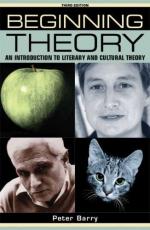
|
| Name: _________________________ | Period: ___________________ |
This test consists of 15 multiple choice questions and 5 short answer questions.
Multiple Choice Questions
1. Peter Barry explains that post-colonial criticism emerges as a distinct category only in the ________.
(a) 1970s.
(b) 1990s.
(c) 1950s.
(d) 2000s.
2. ________ is a co-founder of ecocriticism with Harold Fromm that developed in the early-1990s in the USA.
(a) George Orwell.
(b) Cheryll Glotfelty.
(c) Robert Heinlein.
(d) Frank Herbert.
3. Throughout the nineteenth century, linguistics was usually known as ________, and was almost entirely historical in emphasis.
(a) Phenomenology.
(b) Narratology.
(c) Philology.
(d) Semiology.
4. According to the chapter "Stylistics," in medieval times rhetoric played an important part in training people for the ________, the legal profession, and political or diplomatic life.
(a) Library.
(b) Court.
(c) School.
(d) Church.
5. The panopticon was a design for a circular prison conceived by the eighteenth-century utilitarian ________.
(a) Sigmund Freud.
(b) Ray Bradbury.
(c) Anthony Burgess.
(d) Jeremy Bentham.
6. ________ studies the relationship between literature and physical environment.
(a) Pre-Raphaelitism.
(b) New criticism.
(c) Ecocriticism.
(d) Phonocentrism.
7. The institutional acceptance of the term "queer" dates to a 1990 conference on "queer theory" at what major university?
(a) University of Florida.
(b) University of California.
(c) University of New Mexico.
(d) University of New York.
8. According to Peter Barry, what is the subject of narratology common to all story-telling?
(a) Genre and plot.
(b) Mechanisms and procedures.
(c) Imitation and motivation.
(d) Metaphors and synonyms.
9. Ecocritics emphasize writers who highlight ________ as their subject matter.
(a) Children.
(b) Nature.
(c) Animals.
(d) Feminists.
10. A poem of which author is provided by Peter Barry as an example of ecocriticism?
(a) Geoffrey Chaucer.
(b) Thomas Hardy.
(c) D.H. Lawrence.
(d) Vladimir Nabokov.
11. According to the chapter "Narratology," Russian formalist Vladimir Propp identified how many actions in a tale with seven spheres of action to animate?
(a) 31.
(b) 63.
(c) 13.
(d) 23.
12. According to the narrator, post-colonial critics would discuss the representation of what country in Joseph Conrad's "Heart of Darkness"?
(a) America.
(b) Ireland.
(c) Australia.
(d) Africa.
13. The narrator details that ________ believed that some speech was reported while other speech was mimetic, transposed, or narratized.
(a) Plato.
(b) Aristotle.
(c) Galileo Galilei.
(d) Genette.
14. The narrator explains that narratology studies how narratives, or stories, creates ________.
(a) Meaning.
(b) Icons.
(c) History.
(d) Money.
15. Who is credited with saying that the textuality of history is "an intensified willingness to read all of the textual traces of the past with the attention traditionally conferred only on literary texts"?
(a) Louis.
(b) Dutton.
(c) Greenblatt.
(d) Montrose.
Short Answer Questions
1. In the chapter titled "Stylistics," whom does Peter Barry credit with inventing the term "under-lexicalization"?
2. The chapter "New Historicism and Cultural Materialism" explains that the practice of giving ________ to literary and non-literary material is the first and major difference between the "new" and the "old" historicism.
3. Dollimore and Sinfield defined the term "Political Shakespeare" as designating a critical method which has ________ characteristics.
4. Karl Marx and Friedrich Engels were the join founders of the school of________ according to the Chapter titled "Marxist Criticism."
5. In the phrase "the archival continuum," an important difference between old and new historicisms is encapsulated in the word ________, for that word indicates that new historicism is indeed a historicist rather than a historical movement.
|
This section contains 484 words (approx. 2 pages at 300 words per page) |

|




